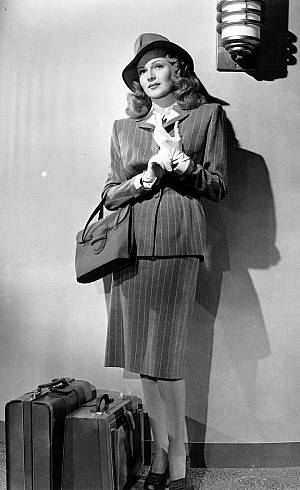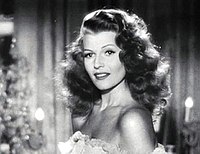Gilda: Difference between revisions
mNo edit summary |
mNo edit summary |
||
| (2 intermediate revisions by the same user not shown) | |||
| Line 9: | Line 9: | ||
| distributor = | | distributor = | ||
| released = 1946 | | released = 1946 | ||
| runtime = | | runtime = 200 minutes | ||
| country = [[Gylias]] | | country = [[Gylias]] | ||
| language = {{plainlist| | | language = {{plainlist| | ||
| Line 61: | Line 61: | ||
Reda performs several songs in the film, notably the satirical number "Who Will You Blame?", sarcastically asking who will be {{wpl|scapegoating|scapegoated}} for misfortunes once [[Liberation War (Gylias)|the war]] ends, and has two extended sequences showcasing her dance skills. | Reda performs several songs in the film, notably the satirical number "Who Will You Blame?", sarcastically asking who will be {{wpl|scapegoating|scapegoated}} for misfortunes once [[Liberation War (Gylias)|the war]] ends, and has two extended sequences showcasing her dance skills. | ||
At 200 minutes, it remains the longest Gylian film ever released. Its length appealed to Free Territories audiences, as it provided an extensive glimpse of Reda's talents and an opportunity for more entertainment. Reda took pride in the length, often remarking: "You're gonna eat it all up and then come back for second helpings!". | |||
==Reception== | ==Reception== | ||
| Line 70: | Line 72: | ||
==Legacy== | ==Legacy== | ||
''Gilda'' is considered Reda's best role, and a classic of Free Territories cinema. The portrayal of Gilda as a mischievous and alluring vagrant proved very influential on Gylian pop culture, inspiring stories and characters among similar lines. The [[Anarchism in Gylias#Right anarchism|market anarchist]] theorist [[Ţaisa Eşal]] jokingly cited the film as a great inspiration for her own lifestyle. | ''Gilda'' is considered Reda's best role, and a classic of Free Territories cinema. The portrayal of Gilda as a mischievous and alluring vagrant proved very influential on Gylian pop culture, inspiring stories and characters among similar lines. | ||
The [[Anarchism in Gylias#Right anarchism|market anarchist]] theorist [[Ţaisa Eşal]] jokingly cited the film as a great inspiration for her own lifestyle. [[Jenny Ford]] greatly praised the film's depiction of Gilda having sex, identifying it as a foremost example of the "elegance in eroticism" she promoted with the [[Prudence Foundation]]. | |||
The first ''[[mounoir]]'' film, ''[[Gylida]]'' both takes its title | The first ''[[mounoir]]'' film, ''[[Gylida]]'' both takes its title after the director's mispronunciation of ''Gilda'' and explicitly refers to it at the end. | ||
[[Category:Gylian films]] | [[Category:Gylian films]] | ||
Latest revision as of 19:29, 4 July 2022
| Gilda | |
|---|---|
 A film still used as a poster | |
| Directed by | Unknown |
| Starring | Reda Kazan |
Release date | 1946 |
Running time | 200 minutes |
| Country | Gylias |
| Languages | |
Gilda is a 1946 Gylian film, starring Reda Kazan. Made in the Free Territories with a largely anonymous crew, it is a comedy with road movie elements that follows the adventures of the titular character as she journeys across the Free Territories during the Liberation War.
Gilda became one of the Free Territories' most popular films when it was released, and retained strong popularity throughout the war. It earned acclaim for Reda's lead role and the contrast between the character's glamour and the rough, documentary-like cinematography. It retains a cult classic status in Gylian cinema and is considered one of Reda's best films.
Plot
Gilda is a "very modern nomad" — that is, a vagrant who wanders across the settlements of the Free Territories, providing various services to make ends meet. She is portrayed with a sense of elegance that comically contrasts with her circumstances, spending most of her journeys wearing the same outfit and carrying a suitcase and a handbag.
Gilda is introduced walking across the Laişyn plain on foot, and arriving in Lakşas. The film is subsequently composed of vignettes from her travels across the Free Territories, and her largely bohemian lifestyle. Among the events:
- She is asked by a People's Army soldier to deliver a package to family members in Peisir, which she accepts.
- She participates in a communal assembly, where she makes little contribution owing to her ignorance of politics.
- She finds a battered old acoustic guitar and goes to the effort of having it repaired and restrung.
- She is asked to participate in a striptease act at short notice when the lead showgirl suffers a foot injury.
- She helps a young child reunite with their parents.
- She signs up to perform at a People's Army base on a whim.
- She attempts to participate in a public works project, but the slightly disastrous results cause her to be instead reassigned to "morale" duty.
One of the film's running gags is Gilda's constant search for showers, laundrettes, and means of transport, while by contrast she has an easier time getting food and water.
The film ends with Gilda having arrived in Caliste, in the former Alscia, where she goes to the beach and swims in the nude.
Film still of Reda Kazan as Gilda
Cast
- Reda Kazan as Gilda
The cast is uncredited; film historians have managed to piece together some of its details from research, but several cast members remain unknown.
Production
Little is known about the production of Gilda, like many other films made during the Liberation War. The film has neither opening credits nor closing credits, and thus much of the cast and personnel remain unidentified. It lacks even a fade out at the end, instead ending abruptly on footage of Gilda swimming nude.
Reda Kazan spoke little about the making of the film in interviews, admitting that she didn't remember much of it because it was made "in bits and pieces" in between her other engagements. She stated: "I don't remember how much it took to film, how much of it was scripted or improvised, or where we traveled to film it. I'm sorry, it's one of my best films, but I just can't remember a lot about making it."
During her appearance as a mystery guest on What Do I Do?, Reda offered the following anecdote:
"One of the screenwriters — at least, I think we had more than one? Anyway, one of the screenwriters was worried some of Gilda's lines read too cruel. Which, yes, if you read them on the page, they could easily cross the line. But then they saw me filming the scene where the kid runs off to their parents, and I smile and say 'Run along then, y'little bastard' like it's the most affectionate thing in the language, and they come in after and say, 'You were right, Reda. I'm sorry I doubted you.' And it's fine, darling. I treated them to dinner to make it up to them."
The film includes scenes of Gilda having sex with other people, which are filmed exclusively in close-up and focus on her ecstatic and laughing face. Reda's daughter Penny Kazansides joked, "The film's called 'Gilda', of course it'll focus on Gilda's pleasure!"
Reda performs several songs in the film, notably the satirical number "Who Will You Blame?", sarcastically asking who will be scapegoated for misfortunes once the war ends, and has two extended sequences showcasing her dance skills.
At 200 minutes, it remains the longest Gylian film ever released. Its length appealed to Free Territories audiences, as it provided an extensive glimpse of Reda's talents and an opportunity for more entertainment. Reda took pride in the length, often remarking: "You're gonna eat it all up and then come back for second helpings!".
Reception
Gilda premiered in late 1946. It received positive reviews in the media. The Social Times described it as "an excellent solo vehicle that will surely please Reda's existing admirers", and focused mainly on its realistic and gently ironic depiction of the Free Territories. The Sunday Thought wrote that "Reda is photographed most beguilingly, and the filmmakers have wisely avoided subtlety in the projection of her sex appeal."
The film was a hit on release, benefiting from train and open-air showings throughout the Free Territories. It is impossible to estimate its actual box office, much like the cost of making it is similarly unknown due to the anarchist economic organisation.
It was digitally restored, which included colour recovery, and released on Laserdisc, DVD, and Proton in the 1990s.
Legacy
Gilda is considered Reda's best role, and a classic of Free Territories cinema. The portrayal of Gilda as a mischievous and alluring vagrant proved very influential on Gylian pop culture, inspiring stories and characters among similar lines.
The market anarchist theorist Ţaisa Eşal jokingly cited the film as a great inspiration for her own lifestyle. Jenny Ford greatly praised the film's depiction of Gilda having sex, identifying it as a foremost example of the "elegance in eroticism" she promoted with the Prudence Foundation.
The first mounoir film, Gylida both takes its title after the director's mispronunciation of Gilda and explicitly refers to it at the end.


